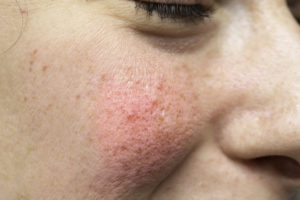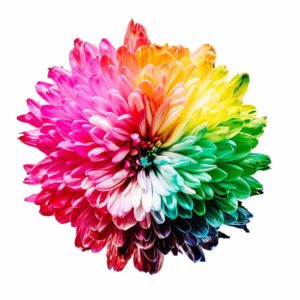Acne Rosacea
Have you noticed a persistent redness on your face, especially in the center by your nose and cheeks? Or swollen red bumps similar to acne? Does your skin feel sensitive or hot to the touch? If you answered yes to any of these questions, you may be suffering from acne rosacea, a common, chronic skin condition that most often affects the face and can become worse if left untreated.
While the current causes of acne rosacea are unknown, many professionals believe that it is a mixture of both genetic and environmental factors that contribute to this skin condition. Things like stress, medicine, temperature, and diet all play a pivotal role in acne rosacea and can trigger flare-ups of rosacea, causing the skin to become sensitive and hot to the touch. In fact, there is probably more than one factor that is causing your acne rosacea.
When it comes to treating acne rosacea, or any other condition at our integrative health practice in Oak Brook, IL, Vitality Family Health goes straight to the root of the problem to better understand WHY this is happening to you. From here we work with you to create a treatment plan that aligns with your values and wellness goals to better manage your acne rosacea more effectively.
Continue reading to learn more about what can contribute to acne rosacea as well as potential triggers for flare-ups and how an integrative medicine approach is the best answer for controlling acne rosacea.
Acne Rosacea Contributing Factors
As previously mentioned, there is still not one known cause of acne rosacea, but the following have been known to contribute to this chronic inflammatory skin condition*:
- Abnormalities in facial blood vessels: Dermatologists agree that abnormalities in the blood vessels of the face cause visible blood vessels, flushing, and persistent redness. The inflammation of these blood vessels may be caused by triggering factors (see below).
- Light skin color: People with lighter skin have a much higher risk of developing acne rosacea than other skin tones. Women with lighter skin are also more likely to have rosacea than men. However, men’s acne rosacea symptoms are usually more severe than women’s.
- Family History: People with acne rosacea usually have a history of rosacea in their family.
- Demodex folliculorum (microscopic mite): This mite lives on the skin and usually causes no issues. However, patients with acne rosacea, have a higher number of mites than others without. It is still unclear whether acne rosacea causes an increased number of mites or vice versa.
- H. Pylori Bacteria: This bacteria found in the gut, stimulates the production of a small polypeptide that causes blood vessels to dilate. Experts believe that this bacterium plays a large role in the development of rosacea.
*poor hygiene is not a contributing factor or cause of acne rosacea.
Acne Rosacea Triggers
Since acne rosacea has no “cure”, our integrative medicine approach focuses on treating the underlying cause of the symptoms and triggers of rosacea to help manage your rosacea. Knowing what triggers your rosacea flare-ups is just one of the ways that we are able to develop a treatment plan and this requires a little detective work. Once your triggers are identified, we will be that much closer to helping you keep the majority of acne rosacea symptoms (flare-ups, sensitive skin, acne-like bumps, etc.,) away. Here are some known common acne rosacea triggers:
- Diet: A variety of foods can cause rosacea flare-ups. Anything from chocolate and soy sauce to citrus fruits and dairy products can affect rosacea inflammation.
- Beverages: Hot beverages (coffee and tea) and alcohol, especially red wine, beer, bourbon, and champagne can trigger rosacea.
- Temperature & Weather: The sun, strong winds, extreme cold and hot temperatures, humidity, and excessively warm environments.
- Medications: Vasodilators (think high blood pressure medication or any medication that dilates blood vessels) and topical steroids.
- Medical Conditions: Menopause, frequent flushing, chronic cough, and caffeine withdrawal syndrome.
- Skincare Products and Makeup
- Physical Exertion
- Stress
- Anxiety
Treating Acne Rosacea: An Integrative Medicine Approach
It is common for people to have more than one trigger that causes acne rosacea flare-ups. As part of our holistic treatment, you can expect us to work on uncovering your unique triggers to manage your acne rosacea in Oak Brook, IL.
Often, in a conventional setting acne rosacea is treated with topical steroid cream (which can worsen your symptoms) and/or oral antibiotics and is sometimes even misdiagnosed as eczema, skin allergies, or acne. This is especially true in cases where the “specialist” only pays attention to the symptoms you’re displaying. While some topical creams may be necessary to relieve some of the discomfort you experience during an acute flare-up, often lifestyle changes, such as stress management and diet changes with an emphasis on Gut Health, are the most direct and effective treatment for acne rosacea. Antibiotics can mask the symptoms of rosacea, but will destroy all of the good bacteria in your gut, which leads to chronic health issues in other systems of your body (trading one symptom for many others). Much like how diet and exercise will give a person more manageable results but may take longer to see said results than going on a crash diet (which hurts more than helps), integrative and functional medicine works the same way. By giving you the tools and skills to keep your acne rosacea in check, you can live a more vital life and not have to worry about potential flare-ups ruining your plans or keeping you from participating in the things you love.
To learn more about how you can thrive with acne rosacea, contact our integrative medicine practice in Oak Brook today. We can’t wait to help you get started on your own journey towards total health and wellness.


